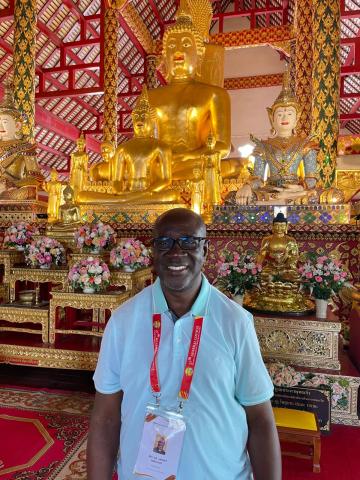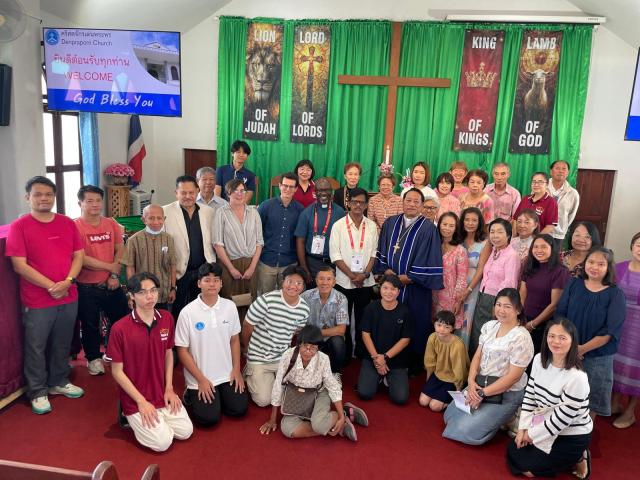At World Communion of Reformed Churches’ 27th General Council, a path towards peace, healing, and justice for churches worldwide

The past few days of the World Communion of Reformed Churches’ (WCRC) 27th General Council have been an intense, soul-stirring journey deeply rooted in reflection, dialogue, and engagement with the heart of our faith as it meets the call for justice in our world (you can read my account of the Council’s opening days on Round the Table). The gathering’s themes of inclusion, community, and transformation have echoed strongly, leaving me profoundly moved and challenged.
Vulnerability and strength
The fourth day opened with a Bible study reflection, inviting us to look again at the familiar story of Jesus feeding the five thousand, but with new eyes. I felt a stirring as the presenter unpacked the often-overlooked contributions of women, children, and others in the crowd. The invitation to move beyond viewing Jesus as the sole provider towards recognizing the collective gifts of the community touched me deeply. It made me reflect on how often, in our own faith communities, certain voices and gifts may be unnoticed or undervalued. Inclusivity and shared responsibility can transform our understanding of ministry in God’s service.
Sessions on ecumenism that followed showed me the complexity and beauty of the church's struggling in its journey toward unity and authentic relationship. Hearing speakers confront the ways theological differences and cultural divides sometimes erect barriers was humbling; I felt part of a larger, sacred conversation. Voices urged us to set aside superiority and embrace a spirit of radical welcome and mutual respect.
Heartening news came when the WCRC extended a historic and sincere apology to the Mennonite World Conference for the persecution of Anabaptists, commemorating 500 years since the Anabaptist movement's inception in 1525. This act of confession, done in Zurich—the symbolic birthplace of both the Reformation and past Anabaptist persecution—was both a recognition and lamentation of the violence, exclusion, and condemnation inflicted by Reformed authorities.
The WCRC openly acknowledged this as a betrayal of the Gospel and expressed deep sorrow for the pain caused. It was an invitation to walk together in reconciliation and mutual respect, forming a renewed family in Christ that embraces both their divergent histories and shared faith. This reconciliation initiative includes gifts of prayers, testimonies, and worship resources to help congregations across the world foster ecumenical healing.
The apology stands as a vivid example of reconciliation in practice—recognizing past wrongs, repenting, and stepping courageously into a shared future marked by justice, humility, and peace. Communion becomes not merely a ritual, but a radical commitment to embody justice through vulnerable relationship and active discipleship. It calls us to courage, humility, and concrete action in the pursuit of unity amidst diversity and historical pain.
The intersection of vulnerability and strength within these conversations deeply affected me. The openness of speakers and participants to share struggles and hopes has been a powerful witness to the Spirit at work. This gathering has stirred a deeper commitment in me to be part of a church that is not afraid to face its brokenness and to journey toward fuller inclusion, justice, and unity.
An eye-opening, celebratory weekend
On Saturday, we visited a unique interfaith network in Thailand whose inspiring work has brought Christians, Muslims, and the Buddhist majority together in a common mission: combating HIV/AIDS. Guided by a gracious Buddhist monk, the session was deeply enlightening, characterized by heartfelt conversations that bridged spiritual traditions and social commitment. After the dialogue, he led us on a visit to the temple and the sacred graves where royal relics are buried.
It was a testament to interfaith cooperation—how spirituality and social justice can intertwine to create compassionate responses to critical challenges like HIV/AIDS. For me, this was a vivid demonstration that the future of faith witness lies in collaborative action for healing and justice.
On Sunday morning, we were warmly welcomed to join worship in local churches, vibrant congregations rich with tradition and hospitality. The music blended local languages with familiar hymn tunes, creating an inclusive and joyful celebration of faith. The sense of community reminded us of the foundational role local churches play in nurturing faith and fellowship.

An afternoon celebration marked the 150th anniversary of the WCRC and its antecedents—a grand event filled with vibrant music, dance, and colorful cultural expressions. Young people sang and danced with joyful energy and participants from around the world showcased their rich heritage, adorning themselves in traditional and cultural attire that added spectacular beauty and diversity to the celebration.
A stirring sermon by Rev. Dr. Jerry Pillay, General Secretary of the World Council of Churches, encouraged perseverance in faith with resilience and hope. He reminded us of the great cloud of witnesses who have kept, lived, and shared the faith across the centuries. The gathering was electric with celebration and fellowship, reflecting the global unity and rich cultural mosaic that the WCRC represents.
The call to peace, justice, and healing
The next day, Rev. Dr. Munther Isaac, a Palestinian pastor, author, and theologian from the West Bank, called on us to undergo our own “road to Damascus” experience. His reflection was rooted in 1 Timothy 1:12–17, which calls us to consider the profound transformation that occurs when one encounters Jesus. Paul’s story of conversion from a violent persecutor to an apostle of radical love reminds us that the Christian journey is about rewiring the heart to embody humility, compassion, and justice, in a complete reorientation of how we see God, ourselves, and others.
The many experiences at General Council reaffirmed that perseverance is not passive endurance but active, Spirit-led engagement with the world’s wounds. Perseverance means standing with the marginalized, listening to their stories, and being willing to be transformed ourselves so that our mission aligns with God’s liberating love.
It challenges the church to reject theologies of supremacy and empire and instead embody accountability, humility, and a living faith that rejoices in diversity and justice. The invitation to "stay unsettled" and keep revoking the call of Scripture in each generation rings clear. We are a communion called to be instruments of God’s transformative justice, peace, and healing in a deeply fractured world.
—Rev. Dr. Japhet Ndhlovu is Executive Minister, Church in Mission, with The United Church of Canada.
The views contained within these blogs are personal and do not necessarily reflect those of The United Church of Canada.